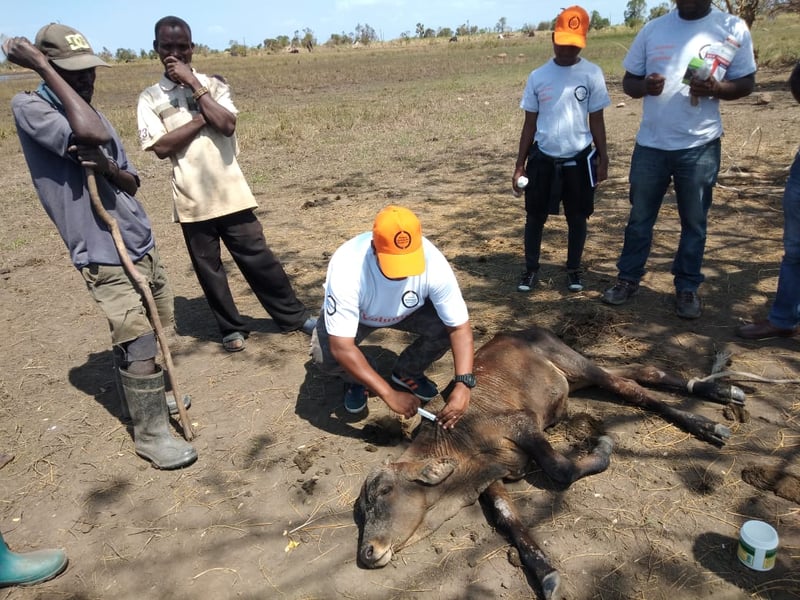
Thousands of animals in desperate need of aid in aftermath of Cyclone Idai
Press release
Thousands of animals in desperate need of aid in aftermath of Cyclone Idai
World Animal Protection’s disaster response teams have arrived in Mozambique and Malawi and are providing urgent care to up to 200,000 animals that have been affected by the floods that have devastated Southern Africa.
One team has arrived in Chimoio, close to Beira, one of the worst affected disaster zones. They are equipped with veterinary kits, including antibiotics, pain killers and hoof rot medicines to treat as many as 2,500 animals including cattle, pigs, dogs and cats in just one day.
Response teams have also provided inductions for 25 veterinarians from four provinces in Mozambique, which includes the basics of how to handle and treat animals in disasters. We have also recruited a team of volunteers to assist in providing essential care for animals in need over the coming days.
Another expert team of vets has been on the ground providing medical assistance to animals in Malawi since Friday, and we are also on standby to respond to Zimbabwe.
Staff on the ground have been providing care to herds at Clifton Meadow, a dairy farm responsible for 94% of all milk production in Mozambique. Staff there said that they had lost 29 animals out of a 400-strong herd, mainly calves, which were crushed against the fence by the winds.
Ondela Voorslag, Manager, Clifton Meadows said:
“It was chaotic. The animals were running up and down the hills, desperately trying to get away from the wind, but there was no escape.
“The roof was lifting up and down and the walls were wet on the inside, so I was afraid. I have never experienced anything like this before.”
Dr. Edwin Nkhulungo, a government veterinary officer responsible for southern Malawi, said:
"The floods in these areas may have longer lasting effects on animals, especially with regard to disease incidences and widespread destruction."
Gerardo Huertas, World Animal Protection Programme Director, Animals in Disasters says:
“Although this natural disaster gave swathes of Africa a deadly blow, the repercussions are taking hold and continued to cause misery and suffering to hundreds of thousands of people and animals. Our priority is helping the animals who are in desperate need – those that are injured, starving or dehydrated and at high risk of disease, so they do not become a second wave of victims.
“Animals are often the forgotten victims in disasters. But local communities who survived this catastrophe will only suffer more if they have no animals or livestock to help them long after the aid has gone, for their livelihoods, transport, food and company.”
More than 750 people and thousands of animals have tragically died from the disaster, and hundreds of thousands more have been affected. People have been forced to abandon their animals, which they rely upon as livestock, as well as much loved family pets, while being evacuated by the government and humanitarian organizations.
Exact numbers are still unknown, but we anticipate hundreds of thousands or even millions of animals affected. Following such a destructive cyclone as Idai, we know animals will often be left injured, stressed, separated from their owners, vulnerable to disease and lacking access to clean food and drinking water.
Sadly, millions of animals suffer in disasters each year. Our previous experience of cyclones and floods tells us that owners are often unable to care for their animals. Livestock and pets are left exposed in the immediate days and weeks after a disaster, often to standing water and sun or heavy rains which pose health risks from disease and prolonged stress. Specifically, animals can become affected by foot rot, digestive and respiratory diseases as well lack of access to clean drinking water.
While disaster response rightly prioritizes people’s immediate needs, the long-term recovery from disasters is inextricably linked with the well-being of their animals. Communities in this area heavily rely on agriculture to make ends meet and in this critical stage, saving animals affected by the flooding will provide stability for their future.
We will provide updates from the field as they come in here through our social pages – Twitter: @movetheworld, Facebook: https://www.facebook.com/WorldAnimalProtectionInt/
If you want to find out more about this work and donate to help our life-saving efforts in Southern Africa, please visit: https://www.worldanimalprotection.org/news/cyclone-idai-we-race-help-20…
ENDS
Notes to editors
For more information, photos and videos or to arrange an interview please contact Kirsty Warren on kirstywarren@worldanimalprotection.org
About 1 billion of the world’s poorest people rely on horses, livestock and other animals for food, transport and their livelihoods. Domestic animals play their part too, providing valued emotional support and companionship
World Animal Protection has been working actively with governments, communities and individuals in disaster management since 1964. We encourage governments to adopt disaster strategies that include animals. Out of 250 disaster responses over 54 years, we have provided aid to over 7 million animals. Explore our work here.
We have saved over seven million animals in disasters over the last 55 years
Gerardo Huertas, World Animal Protection Programme Director, Animals in Disasters says: “Animals are often the forgotten victims in disasters. But local communities who survived this catastrophe will only suffer more if they have no animals or livestock to help them long after the aid has gone, for their livelihoods, transport, food and company.